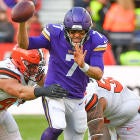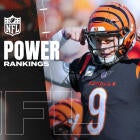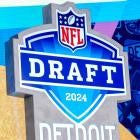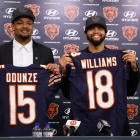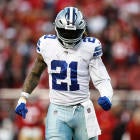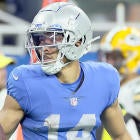Now that the playoffs are in full swing the 2017 financial landscape has been assessed, resulting in the NFL Contract Awards for the fifth-straight year here at CBSSports.com.
These awards differ from the traditional NFL honors because they are from an economic perspective, emphasizing 2017 veteran acquisitions. Players acquired by trades or in free agency can have a tremendous impact on an NFL team's fortunes. Rookies weren't given any consideration because their salaries are a function of draft position and the rookie-wage scale.
Most Valuable Acquisition
Nobody envisioned Keenum becoming a vital part of Minnesota's success when he signed a one-year, $2 million contract with $250,000 in incentives, which he earned, a month into free agency to back up Sam Bradford. He has been the ultimate insurance policy that became necessary for the Vikings to cash in because of Bradford's ailing left knee limiting him to six quarters of action this season, while 2014 first-round pick Teddy Bridgewater, Minnesota's starting quarterback in 2015, was recovering from the career-threatening knee injury he suffered during the 2016 preseason.
Keenum helped the Vikings win the NFC North with a 13-3 record, which tied for best in the NFL, and secure a first-round playoff bye. He was named NFC Offensive Player of the Month for November after guiding the Vikings to a 3-0 record by completing 71.1 percent of his passes (69 of 97) for 866 yards with seven touchdowns and two interceptions to post a 114.0 passer rating. In 15 games (14 starts), Keenum threw for 3,547 yards with 22 touchdowns and only seven interceptions. He connected on 67.6 percent of his passes, which was second in the NFL, and had the league's seventh-best passer rating at 98.6.
Keenum has probably put himself in a position to land a contract with at least the type of money Mike Glennon received from the Bears in free agency with less of a track record. Glennon signed a three-year, $45 million deal, which is destined to become $18.5 million for a single season in Chicago because it took him only four games to lose his starting job to 2017 second-overall pick Mitchell Trubisky.
Keenum winning in the playoffs while continuing to play at a Pro-Bowl level could convince the Vikings to designate him as franchise or transition player. The non-exclusive quarterback franchise tag should be $23.307 million with a $178.1 million 2018 salary cap, which is the high end of cap projections given to teams at a December league meeting. At this cap figure, the transition tag is expected to be $21.029 million.
Runners Up: A.J. Bouye (CB)-Jaguars; Calais Campbell (DE)-Jaguars; Jimmy Garoppolo (QB)-49ers
Least Valuable Acquisition
The expectation was Peterson would complement incumbent running back Mark Ingram, who had his first 1,000 rushing-yard season in 2016, when he signed a two-year, $7.5 million contract (worth up to $15.25 million through salary escalators and incentives) with the Saints shortly before the 2017 NFL Draft. After the Saints traded a 2018 second-round pick to select Alvin Kamara early in the third round, there was speculation that Ingram would be most affected because of more overlap with their skillsets.
It didn't work out that way. Peterson quickly became the odd man out in the crowded Saints backfield. The Saints pulled the plug on the Peterson experiment after four games by trading him to Cardinals for a conditional 2018 sixth-round draft pick. Peterson was a rather expensive four-game proposition for the Saints, costing them almost $2.8 million because he received a $2.5 million signing bonus.
Runners Up: Kenny Britt (WR)-Browns; Mike Glennon (QB)-Bears; Eddie Lacy (RB)-Seahawks; Terrelle Pryor (WR)-Redskins
Offensive Signing of the Year
Whitworth, who signed a three-year, $33.75 million deal (worth up to $36 million with incentives), helped solidify an offensive line that ranked 31st in sacks allowed in 2016 with 49. He is the first quality left tackle the Rams have had since Hall of Famer Orlando Pace's departure nearly a decade ago. The Rams gave up 28 sacks this season, which was ninth in the NFL, and led the league in scoring. The 36 year old was named first team All-Pro for just the second time in his 12-year NFL career.
Runners Up: Alshon Jeffery (WR)-Eagles; Case Keenum (QB)-Vikings
Defensive Signing of the Year
Bouye and Campbell were catalysts in Jacksonville developing arguably the league's best defense. The Jaguars had the NFL's stingiest pass defense, which allowed only 169.9 yards per game. The AFC South champions also ranked second in total defense (286.1 yards per game) and points allowed (16.8 per game).
Bouye came out of nowhere in 2016 to develop into one of the NFL's better cornerbacks during his final season with the Texans. He turned his contract-year success into a five-year, $65 million contract containing $26 million fully guaranteed. Bouye solidified his place among the NFL's top cornerbacks this season. He led NFL cornerbacks with six interceptions and earned his first Pro-Bowl berth. Opposing quarterbacks completed only 45.2 percent of their passes (38 of 84 attempts) when targeting him, for a 31.6 passer rating according to Pro Football Focus (PFF).
Campbell signed a four-year, $60 million deal where $30 million was fully guaranteed. He took the initial AFC Defensive Player of the Week honors this season after a career high and franchise record four sacks against the Texans in his Jaguars debut. He led the AFC with 14.5 sacks. Campbell earned first team All-Pro honors for the first time in his 10 NFL seasons.
Runners Up: Micah Hyde (S)-Bills; Jordan Poyer-(S)-Bills
Biggest Steal
The Eagles never imagined Robinson would have such a big defensive impact when he was given a one-year deal at his $775,000 league minimum salary following an injury plagued 2016 season that led to the Colts releasing him. There was some concern whether Robinson would survive roster cutdowns because of a slow start in training camp after the Eagles made a preseason trade with the Bills for cornerback Ronald Darby, a 2015 second-round pick. Robinson received more extensive playing time than anticipated because Darby dislocated his right ankle in the season opener, which sidelined him for eight games. Robinson was on the field for 68.9 percent of Philadelphia's defensive snaps (710 of 1,031 plays). He excelled in covering slot wide receivers. Robinson led the Eagles with four interceptions and graded out as PFF's fourth-best cornerback this season.
Runner Up: Case Keenum (QB)-Vikings
Best Use of a Contract Year
Lawrence's 6.5 sacks in the first three games of the season helped him garner NFC Defensive Player of the Month honors for September. He tied for second in the NFL with 14.5 sacks. Lawrence is a prime candidate for a franchise tag because of the immense importance of players who can pressure opposing quarterbacks, and his 2017 play is an outlier. The Cowboys would be justified in having concerns about giving Lawrence a deal comparable to Olivier Vernon's with the Giants ($85 million over five years with $52.5 million in guarantees) because his 14.5 sacks this season are 5.5 more than he had in the other 32 games of his NFL career spanning the previous three seasons. The defensive end franchise number is expected to be $17.3 million with a $178.1 million salary cap in 2018.
Runners Up: Jimmy Garoppolo (QB)-49ers; Case Keenum (QB)-Vikings; Andrew Norwell (OG)-Panthers
Worst Use of a Contract Year
Pryor was brought in to help offset the loss of wide receivers Pierre Garcon and DeSean Jackson in free agency. Garcon and Jackson were both 1,000-yard receivers in 2016. Pryor lost the bet he made on himself after a breakout 2016 season of 77 receptions for 1,007 yards with four touchdowns. He rejected the type of money from the Browns that Kenny Britt took to replace him in Cleveland. Britt signed a four-year, $32.5 million deal with $17 million in guarantees. Instead, Pryor took a one-year, $6 million deal worth up to $8 million with incentives in hopes of getting a contract for significantly more than Britt's as a free agent in 2018. The converted quarterback was largely a non-factor during Washington's first five games before seeing a precipitous drop in playing time. Pryor went on injured reserve shortly before Thanksgiving because of an ankle injury that required surgery. Look for the 28 year old to go the one-year prove-it-deal route again for less money that he made this season because he caught only 20 passes for 240 yards and one touchdown in nine games.
Runner Up: Tyler Eifert (TE)-Bengals; Eddie Lacy (RB)-Seahawks
Best Contract-Year Extension (for a team)
Technically, Thielen didn't sign a contract extension. Nonetheless, he qualifies for this category because he was scheduled to make $2.746 million in 2017 on his restricted-free-agent tender before signing a four-year, $19.246 million year deal where he gave up three unrestricted-free-agency years for $16.5 million. These unrestricted years can be worth as much as $25.8 million with outstanding performance during the contract thanks to base-salary escalators and incentives.
Thielen has taken his game to a different level this season after a breakout 2016 campaign in which he caught 68 passes for 967 yards with five touchdowns. He is the first Vikings player to reach 1,000 receiving yards in a season since Sidney Rice in 2009. Thielen's 1,276 receiving yards were the fifth most in the NFL. He was eighth in the league with 91 receptions. Thielen was named second team All-Pro and earned a spot in the Pro Bowl.
The undrafted free agent has given the Vikings the type of production expected out of Greg Jennings when he signed a five-year, $45 million contract (worth a maximum of $47.5 million through salary escalators and incentives) in 2013 while the salary cap was $123 million. The Jennings contract is the equivalent of a deal averaging a little more than $13.5 million per year under the current $167 million salary cap. Davante Adams and Alshon Jeffery, who weren't nearly as productive as Thielen, recently signed extensions respectively with the Packers and Eagles in this neighborhood.
Runner Up: David Andrews (C)-Patriots
Worst Contract-Year Extension (for a team)
Giving Chancellor a three-year, $36 million extension (with $25 million in guarantees) was a curious decision even before the career-threatening neck injury he suffered in early November. It appeared as if his eventual replacement had been found in the third round of the 2017 draft with Delano Hill. Chancellor's deal instantly became a salary floor for his fellow Seahawks safety Earl Thomas, who was made the NFL's highest-paid player at the position in 2014 on an extension averaging $10 million per year. Thomas is under contract through the 2018 season.
Injury guarantees usually don't become relevant in NFL contracts. Chancellor's deal could be an exception. Seahawks head coach Pete Carroll isn't optimistic about the strong safety's return. Chancellor's $6.8 million 2018 base salary and $5.2 million of his $10 million 2019 base salary were guaranteed for injury when he signed the deal in August. The Seahawks will be on the hook for $12 million if Chancellor can't play football anymore because of his neck injury. The standard in Chancellor's contract for the injury guarantee is being unable to pass Seattle's preseason physical examination in the sole discretion of the team doctor. The Seahawks don't have the luxury of time regarding Chancellor's recovery. The $6.8 million becomes fully guaranteed five days after the 2018 waiver period begins. This start date is Feb. 5, which is a day after Super Bowl LII.
It's best for Chancellor financially to let Seattle cut him even if he's already privately decided to stop playing. Chancellor would be letting the Seahawks off the hook for the $12 million by voluntarily retiring. The guarantees would void because he would be breaching his contract. Chancellor would potentially be putting the final $6.2 million payment of his $10 million signing bonus, which he is set to receive on April 1, in jeopardy as well. The Seahawks would be entitled to collect $7.5 million of the $10 million signing bonus that was allocated to the salary cap in Chancellor's 2018 through 2020 contract years. Bonus money wasn't collected from Marshawn Lynch during his one-year retirement after the 2015 season.
There are going to be significant salary-cap ramifications for the Seahawks regardless of the outcome. Chancellor is currently counting $9,581,250 for the 2018 league year, which begins on March 14. Seattle's cap charge for Chancellor would balloon to $19.5 million by releasing him while acknowledging that the injury will prevent his return. It would be composed of the $7.5 million in signing bonus proration from the final three contract years and the two injury guarantees. Guarantees from future contract years accelerate into the current year when a player is released.
Making Chancellor a post-June 1 designation, which would require waiting until the 2018 league year begins and letting the $6.8 million become fully guaranteed, would allow the Seahawks to take the cap hit over two years. Seattle's cap charge would be $14.5 for the upcoming league year and $5 million in 2019 because of the delay in the acceleration of the signing bonus proration from the final two contract years.
Letting Chancellor go before his 2018 base salary becomes fully guaranteed early next month while disputing that the injury is a career-ender would likely result in him filing a grievance. The cap charge would be $12.3 million. In addition to the $7.5 million of signing-bonus proration, 40 percent of the $12 million in dispute, which is $4.8 million, would count on Seattle's books until the arbitrator made a decision. Seattle would get a $4.8 million cap credit with a favorable decision. The remaining $7.2 million would become a cap obligation with a ruling against the Seahawks. A settlement of the grievance would operate in similar manner where a cap credit or debit would depend on the actual amount.
Carrying Chancellor in 2018 at his full cap number with him most likely starting the season on the Physically Unable to Perform list might be Seattle's best option. In the event he did make a recovery, the 2019 injury guarantee wouldn't be an issue and Seattle would have the option to release him before the $5.2 million became fully guaranteed in February 2019. The cap hit would be $5 million with the guarantee out of the picture and $10.2 million if there's still an obligation for it. Either way, Seattle would be getting cap relief because Chancellor's 2019 cap number is $13 million.
Runner Up: C.J. Fiedorowicz (TE)-Texans; T.J. McDonald (S)-Dolphins






























